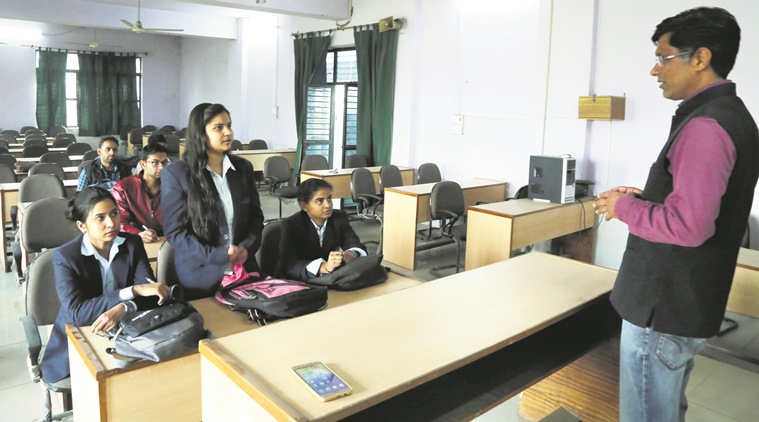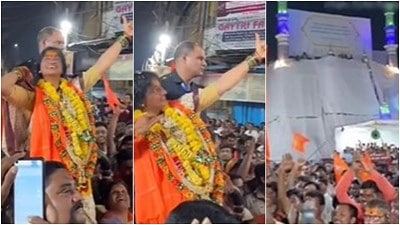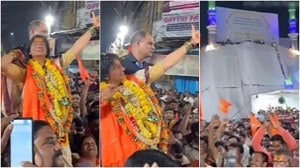- India
- International
Experts sound alarm bells: Dividend can be nightmare, Make in India at risk
An Express Investigation - Part I: According to a 2011 survey by Nasscom, only 17.5 per cent engineering graduates were deemed employable.
 The fourth-year Electronics batch at MIT Bulandshahr, UP, has 12 students against a sanctioned strength of 60. (Express photo: Renuka Puri)
The fourth-year Electronics batch at MIT Bulandshahr, UP, has 12 students against a sanctioned strength of 60. (Express photo: Renuka Puri)
AN estimated 8 lakh BE/BTech engineering students graduated in 2015-16, a little over a quarter of those who finished Class 12 Science that year. And yet, over 50 per cent of seats are going empty amid abandoned lecture halls and ghost campuses.
This paradox, experts say, raises a set of questions that go to the heart of engineering and technology education in the country: Are most poor quality colleges riding on the back of easy approvals? Their graduates with poor skills and employability? Or is this a symptom of the market — an expansion in engineering seats a sign that this is a sector unfettered by regulatory gridlock?
According to a 2011 survey by Nasscom, only 17.5 per cent engineering graduates were deemed employable.
Engineering as a profession has been “devalued”, says former IIT Kanpur director Sanjay Dhande. “It happened in the case of lawyers, Bachelor’s of Arts and, now, nobody gives an engineering graduate a second look. That’s because there are a lot of jobless engineers ready to do any job even if it is something remotely linked to their education,” he says.
Read | BTech (Fail): Empty seats, ghost campuses, unskilled graduates
The problem of underemployment or lack of employability has often been attributed to an outdated syllabus that’s not in sync with the industry and undergraduates training on obsolete equipment. AICTE has a model curriculum, revised every five years, that affiliated universities use as a base to prepare their own syllabus, but most colleges follow decades-old programmes.

That, however, is set to change with the AICTE deciding that the curriculum will be revised once a year. The AICTE has set up a committee of experts, including IIT professors, who have drafted the model engineering syllabus for first-year students.
Experts say the problem of vacant engineering seats comes with larger consequences for the economy.
“Our demographic dividend can be realised only if there is adequate capacity building of people. If that’s not happening, the same dividend can turn into a nightmare,” says nuclear scientist and former chairman of IIT Bombay Anil Kakodkar. “If not fixed on time, the engineering crisis will not spare projects such as Make in India, which depend on home-grown talent.”
RC Bhargava agrees. “We need to improve the quality of education basic, one of the major requirements for Make in India to succeed.”
Former IIM-Bangalore director Pankaj Chandra says the implication of these vacancies is serious. “Although this crisis may appear to affect only a section of the society, everyone should be worried by it. We are living in a world which is driven by engineering science — from mobile phones to cars. If we don’t have strong engineering programmes in the country, we will lose our competitiveness,” says Chandra, an engineer by training who is currently vice-chancellor of Ahmedabad University.
Ironically, both industry and academics admit the problem didn’t catch them by surprise.
“The question was not if this would happen but ,” says Devesh Kapur, director of the Center for the Advanced Study of India and professor of political science at the University of Pennsylvania.
India’s engineering education, he believes, chose the wrong pathway to grow. “Higher education expands either through high-entry barriers (strict ex-ante regulation at entry), which would result in very gradual expansion but presumably of higher quality; or, alternatively, low-entry barriers, which would result in rapid expansion, but of lower quality. We have chosen the latter option, where… over time, weaker quality institutions fail to meet the market test and demand falls and they close down,” he says.
Dhande, the former IIT-Kanpur director, blames AICTE for this mess. “The present approval processes are flawed. The AICTE, the state government and the affiliating universities are not doing proper due diligence before approving new institute,” he says, adding, “Due diligence doesn’t mean checking whether an institute has ‘X’ number of classrooms or not. The approval authorities will have to, for instance, check whether there is enough industry in the area to absorb the graduates and if there are enough educationists on an institute’s management body. Tell me, where’s the industry to absorb engineers in these states? If you create colleges in areas where there’s little employment potential, then obviously, these educational institutions will fail.”
Bhargava refuses to blame the market. “There are jobs for engineers, but the industry now wants quality over quantity. They do not want someone labeled ‘engineer’; they are looking for people with basic competencies that are expected of someone holding a BTech degree,” he says.
On institutes shutting down for want of students, Bharagava says, “Because AICTE failed to check quality of engineering institutes, the market forces are now doing the job for it.”
Former Infosys director T V Mohandas Pai, who is currently Chairman of the Manipal Global Education, attributes the vacant seats to the mismatch in demand and supply and technological changes in the IT sector. “The demand for engineers in the IT sector in India is about 2 to 2.5 lakh, which is the largest in the world. Please remember that this demand cannot be infinite. With automation taking place, the demand for IT engineers will remain stagnant or even come down,” he says.
While most experts worry about the unbridled expansion that led to the present situation, some such as Manish Sabharwal of Teamlease, one of India’s largest staffing and human capital firms, say the growth of the sector has, in fact, helped the country’s labour market.
“In my view, the only way to improve quality is to expand quantity; a license raj can’t accomplish what competition can. Over the last 15 years, engineering seats went from two lakh to 17 lakh. They are now trending back down to the level of 8-10 lakh. This means anybody who wants to be an engineer can be an engineer unlike in medicine, where India needs two lakh doctors but only produces 45,000. AICTE vs MCI is an interesting contrast in regulatory philosophy.
“Of course, the massive expansion in engineering was driven by IT but the huge human capital improvement to India’s stock and flow – India produces more engineers than US and China — will be useful for all non-farm jobs (domestic consumption, manufacturing, sales, service, etc). And the IT doom and gloom is overdone — I am willing to bet that total IT employment in India will rise from 3.5 million to 7 million over the next 5 years,” he says.
Kakodkar disagrees that consolidation should be left to the market forces, saying the government will have to step in and put all new approvals on hold. “When an institution closes at any point of time there are several hundred or a few thousand students studying there. What happens to them? Their careers are involved, their life is involved and somebody has to be responsible for that. If you leave it to market forces, who is responsible for the life of these children?” he asks.
Apr 18: Latest News
- 01
- 02
- 03
- 04
- 05







































